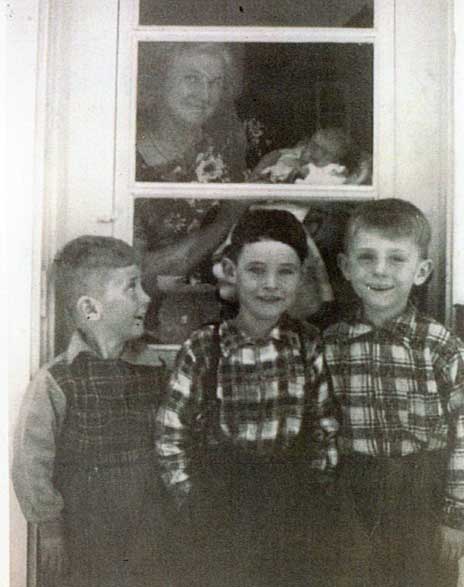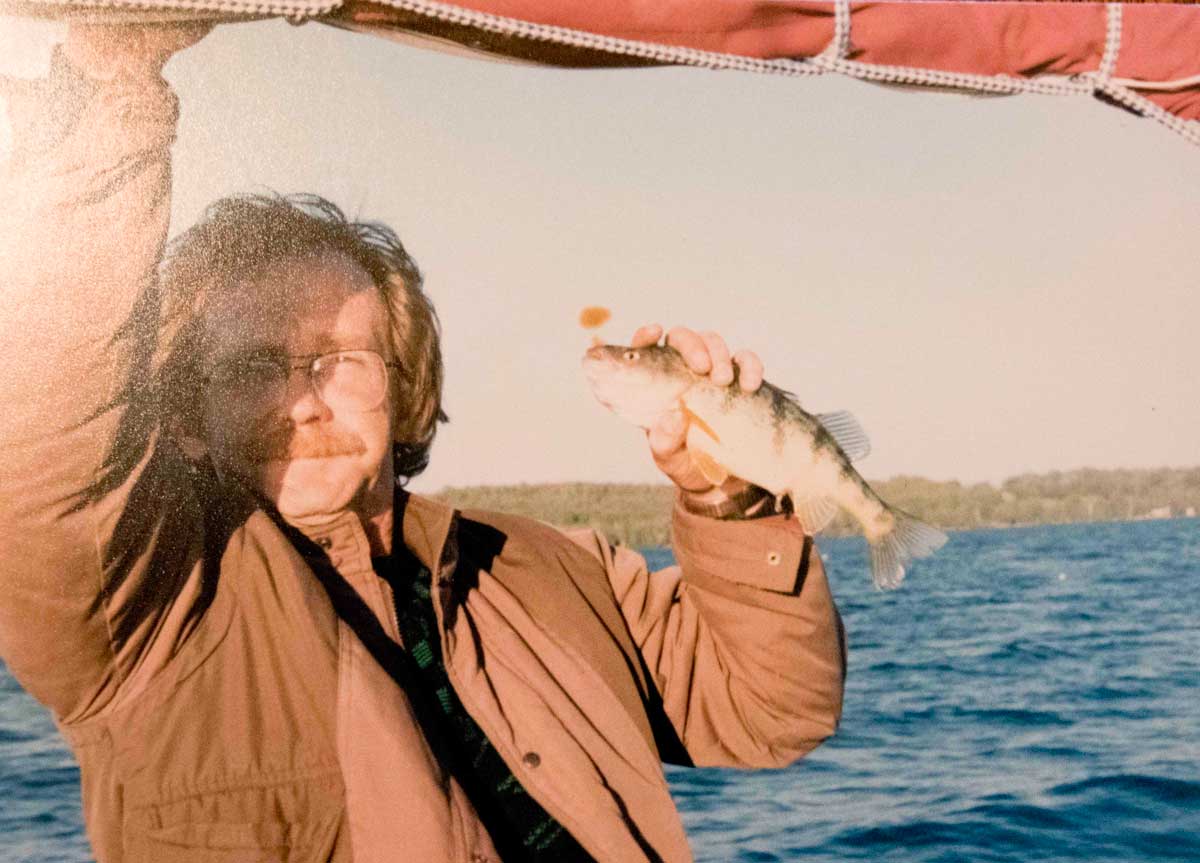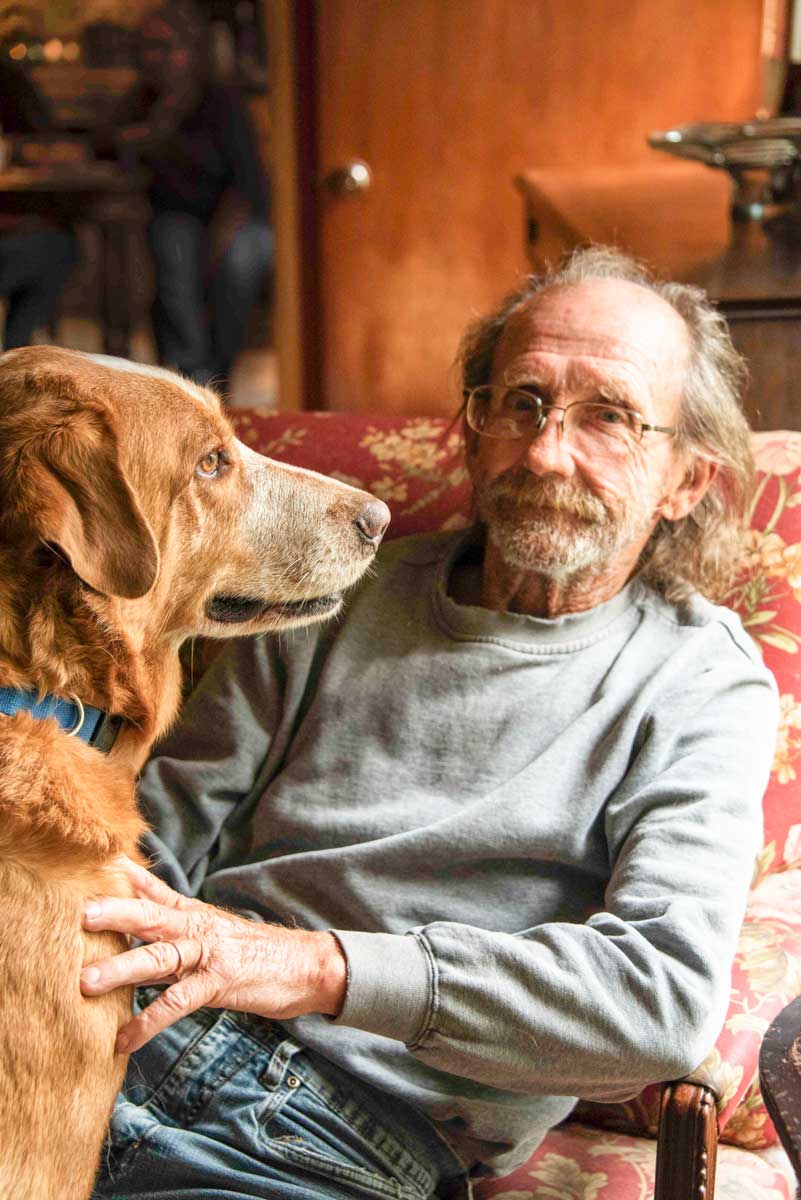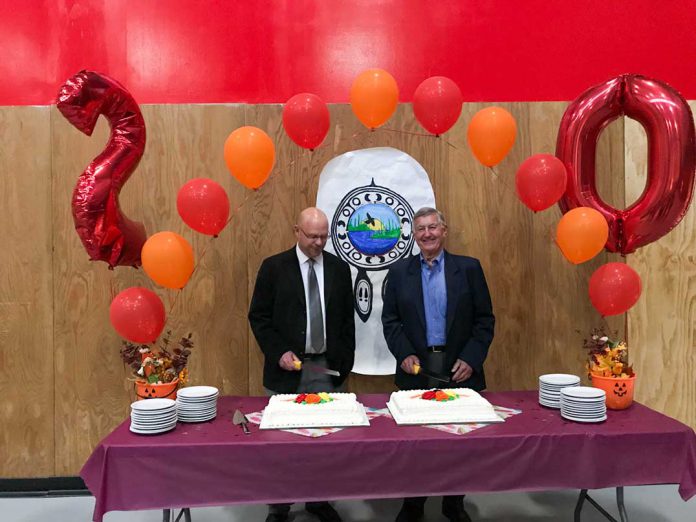by Petra Wall
Gary Bryan
Gary, born with an urge to fish, a great sense of humour and a slight mischievous streak as a youngster, now still spends his daylight hours working hard in the construction industry. “I have been so busy; I’ve been waiting all summer to go fishing with a buddy of mine and now it’s September and we still haven’t been out. It’s crazy! I use all day getting jobs done.” After dark, Gary Bryan comes home exhausted to his Spring Bay abode.
“My mother’s family is from Scotland and my dad is from the same area. Maternal grandmother Jane Gordon was adopted so the history stops there. I do remember Grandfather Oakes. He became the janitor for the school house in Providence Bay and he liked a good joke. One Hallowe’en he moved the outhouse back four feet and covered the opening with sand. When the tricksters came to turn over the outhouse, they fell into the quagmire and likely decided not to trick grandfather again.”
“Another time, he took the ladder and climbed up on the schoolhouse roof and secured the bell ringer to avoid the tolling of the bell that often occurred at Hallowe’en. Sometimes in the summer, he would perch on the roof, which happened to be metal, just to keep the kids at bay and the school safe.” It was likely his responsibility to fix any damage that occurred.

Paternal grandparents Robert and Mabel (Hewett) Bryan lived on the Island and had purchased the farm that became the Orford’s later. The farm was eventually sold, as none of the sons wanted to farm and the family daughter was away at school.
Gary was first-born to Jean (Oakes) and Roy Henry Bryan on July 31, 1947. He was given the second name ‘Robert’ after both his grandfathers. Other siblings were Dale, Jane, Terry and Bonnie. Dad, Roy Henry, at 19, had started a six-year stint overseas. He came back from Europe in 1946 and married Jean. Like many, he didn’t talk much about the war, apart from the camaraderie and about the friends he had made, like the English soldier from Elliot Lake, a regular visitor after the war.
The first house the family owned was moved from the dock into town over the ice with a team of horses. Roy Henry also did carpentry work on the dock at South Baymouth in the 1940s. He owned a sawmill and built cottages as well. “When I got older, I worked with dad on many of these projects, including maintenance for the ferry dock.” Mother Jean worked in Providence Bay, at Reid’s, a small general store that included shoes and clothing.

“We were all taught to swim at a young age. I remember dad teaching me to navigate the length of the dock before he would leave me alone in the water. It took a while but I eventually mastered it. Going to the lake alone was a milestone for me. Another recollection was catching minnows to sell to fishermen. Dad was licenced to use a ‘seine’ a 25-foot net to catch the ‘shiner’ minnows for bigger game fish. The perch loved them. I used to help with that task.”
“We had a big tank with a home-made aerator that held the minnows. Dad would deliver them to all the nearby camps. One time we had a bonanza of minnows in our net. We spent the next day giving away as many as we could so they wouldn’t perish and go ‘belly-up’ in our tank. Some gave us money for them but many were given away free that day.”

“Grandfather Oakes would drive his old truck slowly down the back roads while my brother and I would stand on the side rails, jump off when we saw a beer bottle and run back to the moving truck, throw it in and jump back on. We got to know where all the local ‘off-map drinking spots’ were. Each bottle was worth two cents at the store. Once we found a big stash of ‘full’ beer bottles that someone had hidden for later use. They must have been disappointed when they came back for their booty.”
Grade 1 teacher, Mrs. McDermid, a relative of Murray’s, was our teacher. “I remember she didn’t change much over the years.” Reading was Gary’s favourite subject in the two room-school in Providence Bay. “By the time I was in Grade 4, I had read every book in the school library. I especially enjoyed the old classics.”

“Back then, it was easy to get into trouble. Once, I was punished for eating leeks in school. We knew the wild leeks were quite strong when chewed raw and we knew the teacher would be offended by the pungent smell. If we were annoyed with the teacher, we would bring in the leeks and she would get out the strap. While one of us was being punished, the rest of us wheezed, in response, trying to boost the degree of foul leek odour. Sometimes we were naughty.”
Gary describes the trick they played on the teacher they had in Grades 5 and 6. “He wore a fedora and he would go around the building each day, checking things out. A small group of us would sneak around to the south side of the building and take pot shots at his hat, trying to knock it off. We knew it was his last year there, so we felt safe. I don’t think he ever saw who was trying to dislocate his hat.”

Saturday nights, rural folk often headed for town to lay in groceries. Their kids came too so they could indulge in apple fights with the town youth in the horseshoe pit. Participants like Sandy Denovan and George Gordon would join Gary and his brother to fight for power with a stash of wild apples. Sometimes the kids from out of town would bring in heavy hitters from afar to influence the outcome just a little. This created a ‘little’ resentment that could be worked out later in another match.
When a storm hit town, it was always followed by a gathering of neat stuff on the shoreline. “Some of us would walk the beaches and rocks to look for objects lost from boats off shore. One time, after a particularly bad storm, we found hatch covers, ropes, suitcases and other items. It took four trips to get it all back home. Grandfather Oakes, the entrepreneur, offered all four of us $20 each for all the finds. If you searched, you could also find enough coal to fill a pail. All this treasure-seeking often kept us out of trouble. If we were home too long, we would get a job assigned or we would get into mischief. The choices were ‘walk the shoreline’ or ‘get into trouble.’ We found exploring was more fun, more productive and easier on our rear ends.”
“Movies were offered for 25 cents on Friday nights when a Gore Bay resident came to the Orange Hall. Another quarter bought you pop and chips. It was usually a fun night, although I didn’t like the scary movies much.” Television came along in the 1950s and Gary recalls enjoying the Ed Sullivan Show or Bonanza at the Fullford’s home. He also remembers watching the Beatles at his friend Lyle Liscumb’s camp. “We watched the British singers on a typically small television at the time, but it was still exciting.”
“I got my first bike at age 10. Unfortunately, bicycles were not the most suitable means of transportation at the time, because of the sand and gravel roads. We loved to race to the lake, cast off the bike and jump in. Eventually, the gears were so bogged down with sand they didn’t work well.”
“Summer was the perfect time of the year. You could crawl out of bed, put on your shoes and go right outside, for a swim. Softball was a popular game and most of us played. We had a great hard ball team which included the Dewar brothers and Murray McDermid. Murray could hit the ball further than anyone, starting from home plate, right across the yard and well into a distant yard. He did have a brief time with the Dodgers team in New York, until an injury at home held him back. He was on top of a moving truck holding down building supplies when the truck hit a bump and the wind caught the material and pulled him off the truck onto the road. It took a long time for him to recover but he wasn’t able to go back to the major leagues.”
McColemans are distant relatives on my grandfather’s side. Their old homestead is the white house that is just behind ours here. I remember people saying, you had a cold house if you married a McColeman. The woodstove was the only heat there. They would put all their clothing near it at night so they could step into warm duds in the morning. Later, the McColemans had the property on Square Bay, the site of another saw mill. “As a youngster, I saw half a dozen log booms in Providence Bay. The trees were bigger back then.”
“I remember little Jane running away from home when she was about four. She was upset because she had not been included in the activities of her older brothers Dale and Gary. She had found a suitable bag for her belongings. Dad decided to humour her and give her three heavy books she should read to help her in the big world. He placed them in her bag and she was off on her adventure.” Luckily, the heavy bag necessitated the curtailing of an extensive get-away and she was soon back home.
“About the time I was in Grade 9 we moved to Haileybury where dad had found work. I caught up with my schoolwork and got my driver’s licence in Haileybury. Strangely, I was never stopped by the police before I got my licence but I was detained three times after I got the official licence. Our next stop was Cobalt so dad could refurbish old buildings. I would help him on the weekends. We were still living in Cobalt but I was working in Sudbury with my brother Dale when a tornado hit in 1970. Dad was working at the CIL plant and he saw his neighbour’s car lift up and fly over his car and come down on another car beside his. The tornado also cut a wide swath through the trees which littered the countryside like scattered toothpicks.”
“I dropped out of school after three weeks of Grade 11. There was a job for me in Lynn Lake, Manitoba where my friend from Haileybury, Larry Cook, was waiting for me. Together we worked at open pit mining in northern Manitoba.” After a year or so, Gary moved back to Manitoulin and did some construction work with Calvin Pearson. He learned how to drive the big toys: dump trucks, loaders, bulldozers and other equipment.
“I had a friend in the union and he called one day asking if I wanted a three-day job helping to top off the big stack in Sudbury. The stack was about 18 inches short, just missing one layer and a steel cap. I jumped at the chance because I had always wanted to work on that landmark,” Gary explains. “My second day on the job, a big wind came up and we were all at the top. It seems the stack was built to sustain a six-foot movement in any direction. With the power off, we were kept busy adding powder and water to keep the surface soft for the next layer of super-strength cement. Our moving platform was anchored by the rebar rods that were narrowing as we moved up. These rods, later covered in cement, provided strength to the huge chimney.”
“We were fine in the wind but one worker on the ground was hit by a chunk of concrete which smashed all the bones in his foot. Another worker in the bosun’s chair was banged around on the building and his knees were raw when we got the power back on and got him down. He was shaking when he climbed off and he always wore knee pads after that. I hear today that they can’t decide whether to take the big stack down or leave it for a tourist attraction. It was built to sustain a heavy wind and it had been tested several times, in high winds, passing the test each time; it seems a shame to tear it down.”
Gary met Jane Bush in 1987 at Prescott’s restaurant in Providence Bay. Jane explains that she had managed a craft store for a large company in Toronto. “I liked the city, but life brought me to the Island with my first husband and two children, Jason, and Melissa who is now a Williamson. After I settled here and got work, I wanted to stay, even on my own. Gary had also gone through a first relationship and he has a daughter on the Island, Daughness Migwans.”
“We married in our yard here in Spring Bay. A big tent was erected and it was a lovely day on August 12, 1995. Harold Case, from the Slash, married us. Family and close friends attended the ceremony and a dinner was held at the Bayside Restaurant in Providence Bay. Afterwards we had a get-together with neighbours and friends back in our yard, where a plywood dance floor had been set up. Our honeymoon took us to the Hideaway Lodge near Kagawong.” By a shear twist of fate, Gary was diagnosed with cancer two days after the ceremony. “I went through the chemo and am still around to talk about it, 22 years later.” Gary went right back to work driving the big equipment, a job he loved.
In the winter, their home was heated with a wood stove and some winter mornings Gary would opt to sleep in if he didn’t have to get up early. “I would check the fire and if there was enough wood in the house, I would go back to sleep.” For inspiration to finish cleaning pursuits, Jane liked to imagine that the Queen was coming over. “It helped me focus on the task.” Jane also did a series of jobs at various establishments including, restaurants, the local antique store, Oscar and Ursula Hettmann’s cottages, and Moni’s ‘Art For You Gallery’ on the main street of Gore Bay. “Moni had lots of interesting stuff. We became friends over time, but now she has moved back to Germany, her original home.”
Gary’s siblings have moved on. Dale went out west and worked in open pit mining for a time. Bonnie (McFarlane) of Providence Bay, became the family historian. Jane married Louie Gordon and lives in Little Current. She worked at the hospital, also for the Legion and now works at the Manor. Terry spent time in Gravelbourg, Saskatchewan in social services. “I remember visiting him and noticing dirt drifts that looked like snow drifts here. There weren’t many trees on the prairies.”
Two years ago, Gary had a heart attack while at home. Jane heard him fall and got the ambulance to the house. “I had a double by-pass at the time but I have been fine since,” he shares. Gary still works 12 hour days, five days a week. Strengths for Gary remain carpentry work, skills he learned from his dad, and operating the big trucks and equipment for Calvin Pearson. “I would still love to be more computer literate, but this could only happen in the winter and then it would compete with ice fishing, so it’s not likely to happen.”
“It seems to me that the way kids used to play outside, on their own most of the time, was a better way of life. They helped out when needed and volunteered with garden work, played baseball, and participated in community projects that were part of the curriculum. These tasks helped to promote a more well-rounded community. Today, there is less interaction and people are focused on social media. I feel we have lost something.”
“We haven’t really travelled much. We have Donald, a lab-mix, and five cats. The family down south was visited a few times and we have three beautiful grandchildren now.” Like most of us, Gary and Jane want to stay in their own place, self-sufficient and happy. “The key is to do what you like to do. The only regret I have is that I should have stayed in school longer. I was good at math and a technical school would have been a bonus but I started to work and then I was caught up in that direction.”
Gary boasts that Jane knows all the names of the flowers outside and she confirms that she enjoys working with plants. “At one time, I wanted to be in theatre arts,” she offers. “In high-school we were given a budget and I went out, bought the make-up and we used it for the actors of our ‘Bye Bye Birdie’ production. After high school, I wanted to do makeup for the actors, do art restoration or teach art history, but I chose a different direction too.”
“We just love the Manitoulin. It is so laid back and we know people from one end of the Island to the other,” Gary adds. Jane holds, with a smile, “I never forget a face but I might not remember a name.” Gary tells us it is a terrific place for fishing, catching rainbows in the spring, bass in the summer and perch in the fall and winter. “This Island is a great place to live and it is the place I grew up in. We can’t wait to get back if we are away.”



